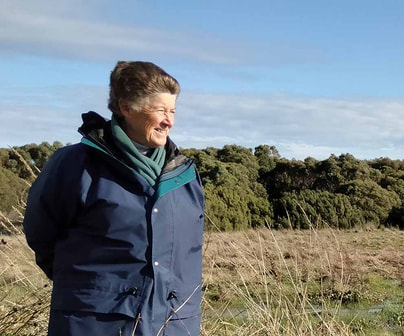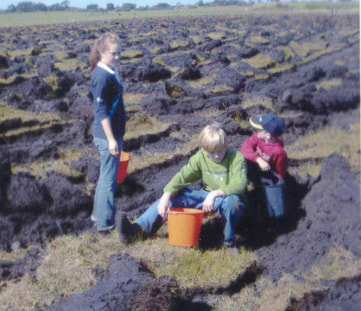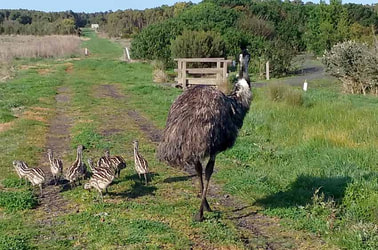 Terri Allen on the Rifle Range Wetlands
Terri Allen on the Rifle Range Wetlands TO SAY that Terri Allen is a blogger for the Post may give you the wrong impression. When she’s got something to “post”, she writes it out in her very neat script on lined airmail paper and visits her sister Leonie who types it up and emails it to me. If Leonie is away, Terri walks over to my place and leaves it in my letterbox and I type it up.
Often after a blog post, a former pupil will send Terri a comment or greeting via her blog page and the communication process unfolds in reverse. I print out the comment or email and take it round to Terri. Then we have a cup of tea and a slice of her home-made cake.
Best wishes, from an appreciative former student
So I googled Terri and found ABC Gippsland had just published an interview with her and her great friend, Margaret Rowe of Leongatha, who had also been awarded an OAM. The two woman are involved in many of the same things – the South Gippsland Conservation Society and the Wonthaggi Seed Bank and Nursery. The Sentinel Times also published an excellent interview with them.
Terri is a biographer, a poet, a naturalist, a conservationist, a teacher … but that’s all covered in those two excellent profiles so I’m not going to repeat it. Instead I’d like to take you on a walk with Terri.
We’d been talking for weeks about a walk in the Wonthaggi heathlands but the weather had been foul. I rang her the next day to see if she had time for a walk, despite her new-found eminence. The heathlands are just about Terri’s favourite place on earth so she didn’t take much persuading. Between showers, the dog and I went around and picked her up and we parked at the Rifle Range wetlands car park.
This used to be the town’s rifle range, a 500-acre, long, triangular paddock. The shooters would stand at one end and shoot a raised target at the other end. They’d put a red flag up when they were shooting so walkers knew to duck. Later on it was leased for grazing but it remained public land.
We’re walking down the track that leads to the heathlands as Terri explains this. A walk with Terri is an education. The conversation roams from history to botany to bird watching but it might also cover drainage, swamps, rivers, estuaries and local politics.
Every Gippsland botanist worth their salt knows how precious the Wonthaggi heathlands are, but reaching them involved a hard slog across barren water-logged paddocks. The local gun club had long since departed. Terri thinks it was something to do with the Port Arthur massacre and gun control. So the seed collectors had an idea. The rifle range could be used to connect the southern end of Wonthaggi through to the heathlands and right through to Harmers Haven and along the coast to Cape Paterson. What a walk that would be!
 Planting day, Rifle Range, 2005
Planting day, Rifle Range, 2005 For the first year the seed collectors watched anxiously for signs of life. Slowly, slowly, the seedlings began to emerge.
In the second year, they created a large shallow wetland, frog pond and a deeper pool to provide habitat for flora and fauna and to purify the stormwater as it trickled across the paddocks towards the Powlett.
“Tony Della Rosa was on the digger doing the main wetland,” Terri recalls. “There was this incredible crack of thunder. The lightning struck the raised arm of the digger and flung Tony off the seat. How he wasn’t killed I don’t know but it disabled the machine.”
 Photo: Leonie Smith (Terri's sister)
Photo: Leonie Smith (Terri's sister) We continue down the track. “There were three trees when we started,” Terri says. Naturally she can remember exactly where they were. “Now look at it! We’ve got kangaroos, wallabies, wombats, echidnas, snakes and antechinuses.”
And plenty of phragmites, the common reed. She points it out and tells me Aboriginal people used the long stems to make spears. Smaller segments were used for nose piercings and necklaces. The young tips could be eaten raw, tubers could be roasted. It’s one of the most common plants in the world. In England the seed heads are used for thatching
There was always a love of nature and knowledge in the Allen family. Terri and her brothers and sister learned the names of all the plants and birds. This bush was their backyard. “We had the most wonderful time. I was 12 and I was in charge of two younger brothers and a sister. We walked to the butts, across to Lake Lister, out to the back beach. We’d stay there all day playing, despite the snakes and the Wonthaggi Monster. We’d listen for the mine whistles so we knew when to come home.”
It was hard leaving all this to go away to study. She hated living in Melbourne. But then she was sent to the Western Districts for her first teaching job and life opened up again. She didn’t have a car so she hitched a ride with whoever was going out into nature. “We were close to the Grampians so when I did get a car that was great. There were other like-minded people.” She moved further away, to the Mallee, and spent a lot of time in the Wyperfeld National Park. She wrote a book about it, the first of many books.
Every Sunday night she and her mother wrote to tell each other what they’d found on their walks. “I can remember Mum writing to say she’d found some red beak orchids flowering on the heathlands. They don’t flower very often so she was really excited.”
Then she transferred to Yarram, closer to home. And finally when she retired she returned to live in the family home in Wonthaggi.
We stop at the “Two Bills” seat, in memory of Bill Slade, a Park Victoria officer who was killed in the 2020 Gippsland fires, and Bill Berry, a neighbouring farmer involved with the original revegetation who died soon after the first Bill. There is a new plaque. Kathy Maffett, 1939-2021. “First seed mistress.” Only Terry could have written that.
I ask her how she’d like to be remembered when her time comes. She wants her ashes scattered in the heathlands, where her parents’ ashes are. And she says they could probably do with another seat, further towards Harmers.
The big spiritual questions don’t interest her very much. The natural world is more than enough for her. She points out a fungi that will open up like a flower. And see, here’s a lowland snow gum, grown from seed taken from a snow gum growing near the Mouth of the Powlett. “We’ve collected the seed and we’ve got patches of 10 in all sorts of places.”
We visit “Harry’s Patch” planted in loving memory of Harry Kiekebosch, another dedicated conservationist, who used to take people with a mental illness out to plant trees. Growing well, he called it.
Terri has written of something similar in one of her blog posts. “I once read that to improve our well-being we needed four things: meeting with like minds, continued learning, outdoor exercise and volunteering. All of these are met by my Monday morning seed collecting group.”
On our way back, she points to a blackwood. “That’s what I’m most proud of.” There are two seedlings coming up underneath it. “We sowed the blackwood back in 2005. And now it’s dropping seeds and the cycle continues.”
Like a teacher marvelling that she is teaching the grandchildren of her first pupil, all those years ago.
Read Terri Allen's blog.